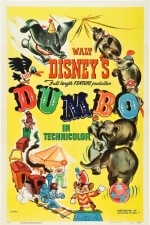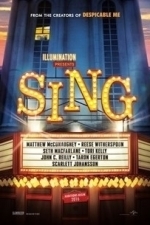Emma @ The Movies (1786 KP) rated Dumbo (1941) in Movies
Sep 25, 2019
Dumbo is such a simple story, and even though the film is only just over an hour long it barely feels like that length of time. It moves along so swiftly, no excess of story, just an excess of cuteness.
The animation is wonderful, simple and yet expressive. Dumbo is adorable the whole way through, I honestly don't know how they managed to capture everything in such a tiny little elephant. When he's dinking the giant peg with his tiny hammer and all the effort he puts in "helping" to put up the big top. Such a talented bunch of people. Although I think they peaked at the scene where he was holding his breath.
With Disney we're obviously treated to that musical element and these classics are oh so singable. I was unashamedly singing along at the top of my voice. I hope you all were too.
If Dumbo was around nowadays he's have been an instant internet sensation, his circus would have been fighting back the crowds. The headlines would have read "Boy spanked by elephant after climbing in to mock baby." People would have praised Mrs Jumbo for defending her child, some would have been calling for her to be put down, while the rest of us normal folk would be going "it serves the little bugger right, who climbs into an elephant enclosure?!"
This was a genuinely entertaining watch if you ignore the dated and slightly insensitive beginning.
Extra:
Deleted Scenes
The Mouse's Tale
Are You A Man Of A Mouse
Backstage Disney
Taking Flight: The Making Of Dumbo
The Magic Of Dumbo: A Ride Of Passage
Sound Design: Excerpt From "The Reluctant Dragon"
Celebrating Dumbo
Original Walt Disney TV Introduction
Trailers
Art Galleries
All of the backstage pieces are interesting to watch but you definitely have to see the Sound Design featurette, they've done it in a really fun way and it really brought a smile to my face.
What you should do
Of course you have to watch it, I don't know why you wouldn't.
Movie thing you wish you could take home
I'd say a flying elephant, but I don't really have the space.
Gareth von Kallenbach (980 KP) rated Smurfs: The Lost Village (2017) in Movies
Jul 12, 2019
The film centered around Smurfette, the only female Smurf, and her struggle to find her place in Smurf Village. Smurfette was not born a Smurf. Gargamel used his magic to turn a piece of clay into Smurfette. His intent was to have his creation, Smurfette, lead him to Smurf village and capture all the Smurfs. Fortunately, Papa Smurf had his own magic and used it to turn Smurfette from evil to good.
Fast forward to present Smurf-day, Smurfette (Demi Lovato) tries her best to fit in, but ultimately has a serious identity crisis. So what does one do when they can’t figure out who they are? They go in search of their own identity. Along the way, Smurfette crosses paths with a strange creature. Eager to find out who this creature is, against Papa Smurf”s request, Smurfette decides to enter the Forbidden Forest. An area no Smurf has even been allowed to visit. She is joined by her brothers Brainy, Clumsy, and Hefty-who unfortunately end up in Gargamel’s clutches. Gargamel (Rainn Wilson) uses his magic and finds out the there is another Smurf village, one that lies beyond the Forbidden Forest. Knowing the damage they have caused, Smurfette and her brothers trek has now changed into a rescue mission. They must reach the lost village before Gargamel and his cat, Azrael and warn the villagers of his evil plan. Who are these villagers? Hmm….
You don’t have to watch the first 2 Smurf films to understand what this one is about. They are completely different storylines and this one is 100% animation. A full return to the tone and characteristics of the beloved 80s cartoon. From the comedic gestures to the close escape from Gagamel, the movie provides loads of entertainment. It tugs at the heartstrings because we’ve all experienced self doubt. It does brush on moments of girl power and of course there are musical dance numbers. Really all the Smurfy fans that enjoyed the Smurfiness of yester-year Smurfs, will definitely find this movie the Smurftastic.
Gareth von Kallenbach (980 KP) rated Sing (2016) in Movies
Jul 12, 2019
Buster Moon (voiced by Matthew McConaughey), has achieved his childhood dream of owning a theater. Business have become bleak, the once grand Moon Theater is in disrepair. With the bank ready to repo the property, in a stroke of desperation, Buster comes up with the idea that a singing competition would be the solution. Aided by his trusty assistant, Miss Crawley, Buster begins the audition to find the next big star.
The audition brings out all creatures great and small; from Meena, the shy elephant with the gift of song (voiced by the exceptionally talented Tori Kelly) to Mike, the mouse (voiced by Seth MacFarlane) a crooner who is out for himself. The rag-tag bunch includes Rosita (voiced by Reese Witherspoon), the stay at home mom who feels like she has lost who she was, paired with Gunther (voiced by Nick Kroll) the dancer with the greatest self image ever. Johnny (voiced by Taron Egerton) the dedicated son who does not want to go into the family business with his dad, who instead wants to sing. Rounding out the performers is Ash (voiced by Scarlett Johansson) the timid girl that breaks out into an angst-y rocker that just wants to play her music.
The story is cute and charming with some laugh-snort moments. We are given glimpses into the lives of each performer, providing us with the background on what motivates each to be in the competition. We also get some history of Buddy, how he came to own the theater, his best friend Eddie (voiced by John C. Reilly) and Eddie’s Grandmother (Older Nana – voiced by Jennifer Saunders, Younger Nana – voiced by Jennifer Hudson). The last third is the best part of the film. We finally see each performance where we were only given little glimpses prior. There are some surprising performances. I had no idea that Taron Egerton, who plays Johnny, the silverback(The Kingsmen, Eddie the Eagle) sings so beautifully. The highlight for me is when Tori Kelly (Meena) sings the Stevie Wonder tune “Don’t You Worry ‘Bout A Thing.” Her rendition lives on still as my earworm.
I was pleasantly surprised by the film, I definitely did not expect it to be quite as enjoyable. It’s not “Despicable Me” or” Minions”, it is a fun family movie that is worth watching that has laughs for the adults as well.

UPAD for iCloud
Productivity
App
Finally, UPAD has re-arrived! When downloading UPAD, your iPad becomes more of a worthy instrument....

Slots - Classic Vegas Casino
Games
App
Escape to Las Vegas and enjoy the thrill of free classic slots machine games! Filled with all your...

Decibel 10 PRO dBA Noise Meter
Utilities and Education
App
"Decibel 10" is one of very few noise/sound meter apps on the market that has highly reliable,...
528hz Solfeggio Sonic Meditation by Glenn Harrold & Ali Calderwood
Lifestyle
App
Transform your life, repair DNA and create miracles in your life with this amazing meditation...

SuperMetronome Groovebox Pro - Drum Machine
Music and Entertainment
App
The best metronome for iPhone, is also an intuitive and powerful groove box / drum machine with high...

BeatMaker 3
Music and Productivity
App
▸ REDEFINING MUSIC PRODUCTION BeatMaker brings unmatched efficiency and depth in an intuitive...

Piano Guitar Harmony MIDI Studio Pro
Music and Education
App
Never need sheet music again. Chord any song in minutes and hear and fine-tune you creations. ...



